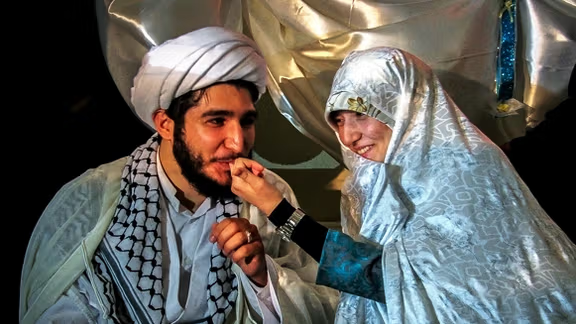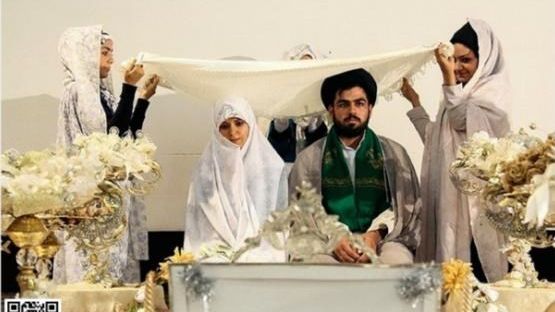The Lifestyle Of Iran’s Shiite Clerics - Marriage And Connections

This article is the fifth in a series about Iran’s Shiite clerics, explaining how they study, get a clerical rank, get married and what they do for a living.

This article is the fifth in a series about Iran’s Shiite clerics, explaining how they study, get a clerical rank, get married and what they do for a living.
--------------------------------------------------------------------------------------------------------------------------
In an article meant to warn young women against marrying a cleric, Seyyed Yaser Taqavi, a new-generation Iranian cleric born in 1991, says getting married to a cleric is not as easy some may have seen in Iranian movies.
Everyone in Iran knows that Islam encourages marriage. But still, everyone knows that getting married is one of the most difficult things to do for a variety of financial, cultural and other reasons.
For clerics, however, marriage is one of the few ways of what sociologists call "upward mobility." In a country where nepotism is a prevalent practice, almost every cleric and non-cleric who is in a position of power in Iran owes his position at least partly to kinship.
President Ebrahim Raisi is the son-in-law of Mashhad Friday Prayer Imam Ahmad Alamolhoda. Former Majles Speaker Ali Larijani is the son-in-law of Ayatollah Morteza Motahari. The children and grandchildren of the founder of the Islamic Republic Ruhollah Khomeini are married to the children and grandchildren of other prominent clergymen, such as Ayatollah Soltani in Qom and Ayatollah Khatami in Yazd, most of whom are or were in positions of power.

Supreme Leader Ali Khamenei's eldest son Mostafa is married to the daughter of Ayatollah Khoshvaght and his other son Mojtaba is married to the daughter of former Parliament Speaker Gholamali Haddad. One of his daughters is the daughter-in-law of his chief of staff Mohammad Mohammadi Golpayegani. Almost every minister in every Iranian cabinet was and is somehow linked to a clerical clan. So, getting married to the right family is important for any cleric and vice versa.
Unlike most universities where students pay a tuition fee to study, seminary students receive a monthly stipend (shahriyeh) from their main teacher, usually an influential ayatollah. The money is barely enough to make ends meet, but the amount differs for students at different levels. Married clerics earn more than single clerics and male students get more than female students. Yes! There are female clerics too, but they study atseparate places where no man can see them. Even teachers lecture from behind a curtain and most female clerics have small jobs at the ministry of education.
Currently the best paid clerical students get between 15 to 45 million rials or $60-170 a month. The stipend has increased in recent years due to rising inflation. The total money spent on stipends is massive but there is no definite figure. For instance, according to Hawzah News, there are 7,000 clerical students only in Mazandaran Province, which has no major religious center. The number is nuch higher in Qom or Mashhad.

However, for many seminary students the hardship on living on a stipend is the price to pay for social mobility.
Getting married to someone from a big and influential clerical clan facilitates employment in well-connected entities where clerics and others can get hefty salaries. Choosing the right family may give the young cleric a position of power and its financial windfall.
But finding access to money and power is not the only reason for clerics to look for a spouse from a clerical family. There are also social reasons. Most Iranians resent the political power of the clergy, which makes them unpopular among young women and in some cases their parents.
According to Taqavi, most clerical students get married before completing their seminary studies. Very few of them get married to female seminary students because they can hardly meet them. For most, brides are chosen by their families through an arranged marriage. Generally, according to Taqavi, clerics are said to be good husbands, as they fear God and want to maintain a good social standing.
Taqavi says that some seminarians coming from non-clerical families sometimes find themselves shunned by their families for choosing to become a cleric. In this case, their families are unlikely to help them find a bride. So, they seek help from their teachers and seminary officials to act as go-betweens with the family of the bride to be.
Unlike the customs in ordinary families, the meetings where families ask for the bride's hand are segregated with men and women sitting in separate rooms. However, the couple find a chance to talk privately, of course, while the families listen from behind the door.
There is no music or dance in most clerical wedding ceremonies, although in some cases women, segregated from men, do play music and dance. In rare occasions the guests have been seen enjoying eulogies about the birth of Shi'ite saints.
"Becoming the wife of a cleric will not guarantee that you go to paradise. Even the clerics' own transition to paradise after their death is not guaranteed. But you can be sure that clerics really love their wives," says Taqavi.